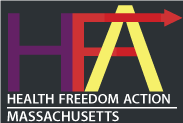The purpose of HFAM is to ensure that the citizens of Massachusetts have the freedom to choose and access all healing arts and ensure practitioners have the right to practice legally. This is achieved by:
Working on a local and state level to educate the public and
Participating in legislative, legal and public policy reform to accomplish the above goals.
Brief History of HFAM:
Health Freedom Action Massachusetts (HFAM) was originally incorporated in 2003 as a 501(c)4 organization (contributions or gifts to HFAM are not deductible as charitable contributions for federal income tax purposes). In 2014 a new board was formed and revitalized the efforts to pass a health freedom bill for Massachusetts.
HFAM has worked to advance an initiative that balances consumer protections and public safety with the rights of those practicing healing arts. With the recent passage of health care reform on the state and national levels, it is now more important than ever that consumers have the right to safely access healing arts.
In 2018, HFAM’s Board of Directors appointed a Steering Committee for the Protection and Access to Complementary and Alternative Health Care to spearhead the development and support of a bill to:
- Ensure access to complementary and alternative health care to all citizens of the Commonwealth.
- Exempt complementary and alternative practitioners from other practice acts through adhering to stipulated guidelines
The intent is to submit the bill in the current legislative session. The full process of passing our bill may take more than a year to complete and will require the commitment of individuals throughout the state. Please reach out to us if you are interested in helping!
Current status:
You can read the full text of bills here: S.1380/H.2343
Key provisions of the Health Freedom Bill:
- Greater access to healing arts practitioners by the acknowledgment of its inherent benefits
- Strengthened consumer protections to ensure public rights and safety
- Enhanced practitioner safety underscoring the right to practice
- Required disclosures relating to services and skills
- Uniform informed consent mechanisms
